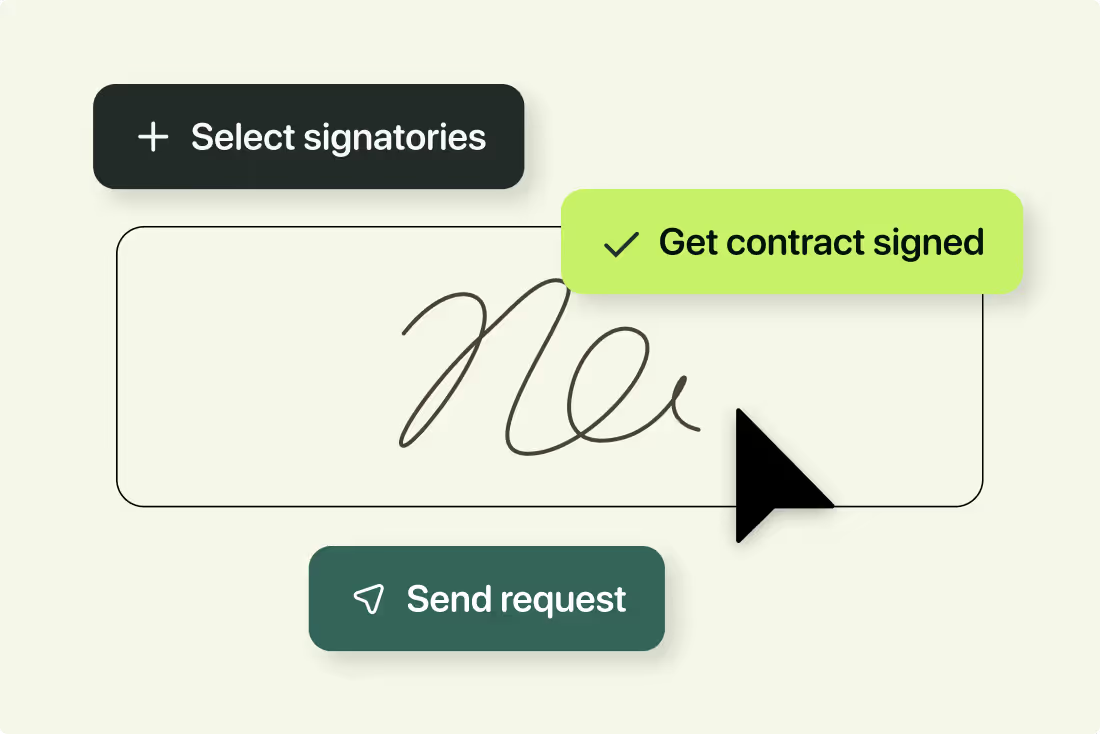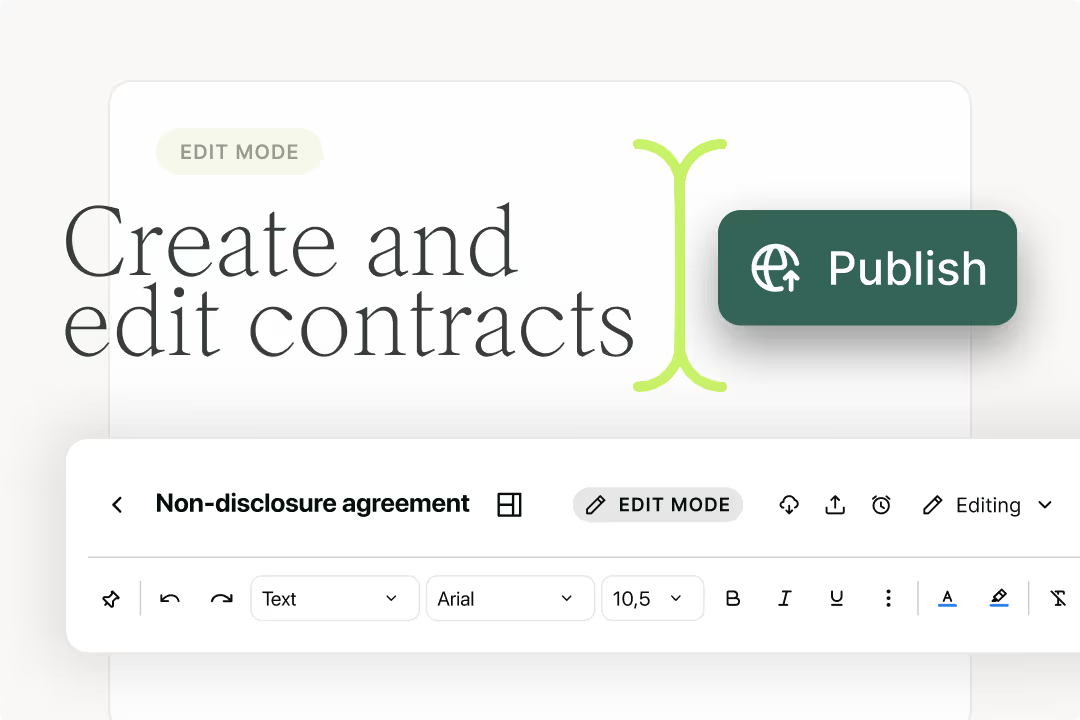Solutions
Customer Support
Resources
Explore what Docusign is, how it works, and what you need to know before signing up, including how much it costs and whether there are better tools on the market.
Docusign is a recognized electronic signature software provider that enables businesses and individuals to sign documents digitally, instead of with wet ink signatures.
Although they are less popular than Docusign’s eSignature offering, the software company also offers other related products, including identification tools, payment handling, document generation, and more.
Docusign is headquartered in San Francisco, California, and was set up in 2003, benefitting from a growing customer and user base ever since.
DocuSign works by allowing individuals to upload, send, and sign documents and contracts electronically. This enables parties to sign agreements from any device, eliminating the need for in-person signatures or manual scanning. Here’s what the step-by-step process looks like:
The sender uploads the document that needs to be signed to Docusign's platform. This can be done via the web application, mobile app, or integrated software. Alternatively, you can access an existing Docusign template.

The sender enters the email addresses of the recipients who need to sign the document. They can add multiple recipients if the contract or document has several different parties.

The sender adds signature fields and other required fields (such as date, initials, checkboxes, and text fields) on the document. This tells recipients where to sign and provide other necessary information within the document.

Once prepared, the sender sends the document to the recipients. Docusign notifies recipients via email that they have a document to sign. You can also bulk send documents in Docusign.

Recipients click on the link in the email to access the document. They review the document and follow the prompts to add their electronic signatures and populate any necessary fields.

After all recipients have signed, Docusign finalizes the document. All parties receive a copy of the signed document via email, and the sender can download it from the DocuSign platform.
Docusign, while highly effective for electronic signatures and basic document workflows, has several limitations when compared to comprehensive contract management software. Let's explore these now.
Docusign focuses on the signature aspect of contracts, leaving out end-to-end contract lifecycle management features such as drafting, negotiation, approval, and storage that are essential for managing contracts efficiently.
Contract management software, on the other hand, offers an integrated workspace where all stages of the contract process can be handled seamlessly, reducing the need for multiple tools and improving overall efficiency.

Another significant limitation of Docusign is its lack of robust collaboration tools and advanced automation capabilities. While it facilitates basic signing and document management, it falls short in enabling multiple stakeholders to collaborate on drafting and negotiating contracts simultaneously.
Tools like Juro bridge this gap by providing features that support real-time collaboration and use contract AI to automate various aspects of the contract lifecycle, such as drafting, smart suggestions, and workflow automation, which significantly accelerates the process.
Finally, Docusign’s basic storage and document management capabilities do not match the advanced features of contract management software, which includes dynamic contract repositories with sophisticated search, reporting, and analytics functions. This allows for deeper insights into contract risks and performance.
Moreover, contract management software is designed to empower business teams to self-serve on contract creation and management directly from their existing systems, enhancing efficiency and reducing legal bottlenecks.
With highly customizable workflows and built-in regulatory compliance and security features, contract management software provides a more comprehensive, intuitive, and secure solution for managing contracts throughout their lifecycle.
Docusign is a fast and effective tool for creating electronic signatures, but the limitations of the platform mean that DocuSign alternatives such as Juro or PandaDoc will likely be more suitable for businesses that want to manage contracts end-to-end in one place and speed up contracting beyond the signing stage.
Similarly, lots of businesses will be looking for a cheaper alternative to Docusign, making SignNow or Dropbox Sign a better option.
Ultimately, the best DocuSign alternative for you depends on your specific needs, budget and ambitions. If you're looking to replace a fragmented contract process that relies heavily on manual workflows and separate tools, Juro will be the best option for you.

Juro’s AI-native contract automation platform empowers legal and other business teams to accelerate the creation, execution and management of contracts. Juro users can do so much more than just sign agreements.
They can automate them, giving legal and commercial teams more time for focus on the higher-value work that matters most - like closing or preparing for new stages of the business' growth.
To find out more, hit the button below to book your personalized demo. To learn more about Docusign's legality, cost, and suitability, read on.

You will have to pay for Docusign if you want to use it beyond the 30 day free trial offered by the eSigning tool. After this period, you will need to choose from one of the following plans:
It's important to note that DocuSign pricing has different variables and add-ons, like the ability to send contracts for signing via SMS, or extra Docusign envelopes. Make sure you're taking this into account when budgeting for the solution.
Docusign’s signatures are legally binding in most jurisdictions, including all US states. This is true for most electronic signature software solutions, since its the eSignatures not the vendors that are deemed ‘legal’ or ‘valid’.
That said, it’s still good to know which laws apply to eSignatures, and what the exceptions are:
However, there are some exceptions where electronic signatures may not be valid, such as certain types of wills, court orders, and specific real estate transactions.
It's always best to check the specific requirements of the jurisdiction and type of document you're dealing with to stay compliant, whether you’re a Docusign user or not.

Docusign have plenty of security measures in place that make it a safe option for businesses that want to sign documents securely. Find out more in this guide to Docusign's security features.
No. Only the person sending the document needs a Docusign account. The recipient does not need one to sign the document. This is the case for most eSigning and contract management solutions, including Juro.
There is not a free version of Docusign. However, you can test it for free for 30 days (with limits). You can also find out more about Docusign's pricing.
No. They are both separate eSignature solutions offered by different companies. You can compare them in this guide to Adobe Sign vs DocuSign.
Docusign is accepted in most countries worldwide. This is also true for Juro.
Yes. Docusign is relatively easy to learn and use due to how basic the platform is. It is rated 9/10 for ease of use according to G2 reviews. You can also access Docusign's support resources.
Yes. DocuSign is a trusted eSignature provider. Just be wary about DocuSign phishing scams.
Yes. Like Juro, Docusign integrates with popular applications like HubSpot, Salesforce, Google Drive, and more.
Docusign supports a variety of file formats, inclujding PDFs, Word files, Excel sheets, and more.
Like Juro, Docusign can be used on mobile devices.
Lorem ipsum dolor sit amet, consectetur adipiscing elit. Suspendisse varius enim in eros elementum tristique. Duis cursus, mi quis viverra ornare, eros dolor interdum nulla, ut commodo diam libero vitae erat. Aenean faucibus nibh et justo cursus id rutrum lorem imperdiet. Nunc ut sem vitae risus tristique posuere.

